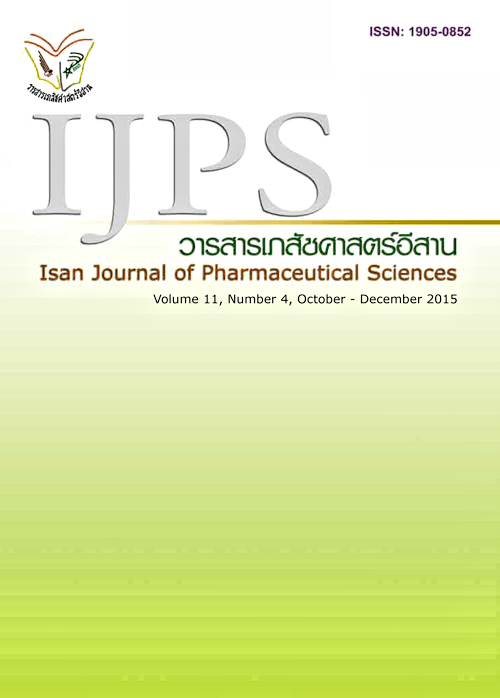Outcomes of Pharmaceutical care for Smoking Cessation in Asthmatic Outpatient at Smoking Cessation Clinic PRA-ARJAN-FAN-ARJARO Hospital
Main Article Content
Abstract
Introduction: This randomized controlled trial study aimed to evaluate the outcomes of pharmaceutical care for smoking cessation in asthmatic outpatients who were smoking and followed up at Smoking Cessation Clinic, PRA-ARJAN-FAN-ARJARO Hospital, Pannanikhom District, Sakol Nakhon. Method: Asthmatic pateint 60 volunteers who enrolled into the program were divided into two groups, including 30 volunteers in an intervention group and 30 volunteers in a control group. The intervention group received pharmaceutical care within 6 months. Results: After the 6-month follow up revealed that the intervention group had signifi cantly higher scores of knowledge of cigarettes 12.50+1.25 score than the control group 9.13+1.87 score, respectively (p<0.05), numbers of smoked cigarettes of the intervention group were signifi cantly lower than the control group (0.17+0.65 rolls and 24.23+3.89 rolls, respectively, p<0.05). The intervention group had mean of the Peak Expiratory Flow Rate (PEFR) signifi cantly higher than the control group (419.67+56.30 L/min and 380.00+43.87 L/min, respectively, p<0.05). Mean scores of quality of life in the intervention group were signifi cantly higher than the control group (p<0.05). Conclusion: Overall, the provision of pharmaceutical care activities for the asthmatic outpatients can possibly help them to quit smoking and have better lung functions (PEFR) and the quality of life in patients has been improved after cigarette quit.
Article Details
In the case that some parts are used by others The author must Confirm that obtaining permission to use some of the original authors. And must attach evidence That the permission has been included
References
Bonertz L. The pharmacist’s role in smoking cessation in patients with COPD. CPJ/RPC 2007;140(3): S33.
Ekkapoj Worajinda. Effects of pharmaceutical care in community health centers in smokers Thakhonyang. Kantharawichai district Mahasarakham province. B.Sc. thesis Mahasarakham University. Granda-Orive JI, Martínez-Albiach JM.Smoking cessation in patients with chronic obstructive pulmonary disease. Arch Bronconeumal 2005:41(11):625-33.
Jang AS, Park SW, Kim DJ, et al. Effects of smoking cessation on airfl ow obstruction and quality of life in asthmatic smokers. Allergy Asthma Immunol Res 2010;2(4): 254-9.
Kanokporn D, Natwipa T, Suvimol K, et al. Effects of smoking cessation clinic in drugstores, university and hospitals. IJPS 2014;9(1): 174.
Kunawaradisai N, Surapat W. Screening and Counseling on Smoking Cessation by Hospital Pharmacist in the Outpatient Service. Thai Journal of Hospital Pharmacy 2011;21(2): 126-37.
Megan E. piper, Susan Kenford, Michael C. Fiore, et al. Smoking Cessation and Quality of Life: Changes in Life Satisfaction Over Three Years Following a Quit Attempt. NIH public access 2012; 43(2): 262–270
National Statistical Offi ce. The Adult World used tobacco project Available at http://service.nso.go.th/nso/nsopublish/service/survey/gats_09-2.pdf. (10 January 2011)
Prakit Watheesathokkit, Kronggit Watheesathokkit. Encyclopedia Thailand for Youth 2004; 28(1).
Phongsri Srimorakot and Sasithon Paratasinlapin. Therapy for smoking cessation with no drug method In Somkieat Watthanasirichaikul, editor. The tobacco control for health professional staff and students. 2006.Research and knowledge management for tobacco control. Situation of tobacco. Available at http://www.trc.or.th/upload/publications/cigareport%202010.pdf (1 January 2011)
Saranya Benchakul, Montha Kengkarnpanich, Lukkhana termsirichaikul, et al. Thailand situation of tobacco consumption trends of the population aged 15 years and over the years 1991-2009. Available at http://www.thaiantitobacco.com/cms/uploads/menusub/doc/Fact_chee1_4.pdf (21 December 2010)
Sunida Preechawong. Harmful tobacco products. Tobacco Control J 2007;1(2): 81-88.
Suthud Roongraeunghirunya. The treatment of smoker addict. In Somkieat Watthanasirichaikul, editor. The tobacco control for health professional staff and students. 2006
Suthud Roongraeunghirunya. Toxins in cigarette smoke and the overall impact on health. Available at http://smartquitclinic.org/pdf/material7.pdf (12 January 2011)
Thidarat A, Benjamas D, Wanlapa K, et al. Results provide advice and medication for smoking cessation in pharmacy university in collaboration with primary care services. IJPS 2013;8(1): 41.
Tønnesen P, Pisinger C, Hvidberg S, et al. Effects of smoking cessation and reduction in asthmatics. Nicotine & Tobacco Research 2005;7(1):139-48.
U.S. Department of Health and Human Services. The Health Consequences of Smoking: what it means to you. U.S. Department of Health and Human Services, Centers for Disease Control and Prevention, National Center for Chronic Disease Prevention and Health Promotion, Office on Smoking and Health, 2004.
U.S. Department of Health and Human Services. The Health Consequences of Involuntary Exposure to Tobacco Smoke: A Report of the Surgeon General. Atlanta, GA: U.S. Department of Health and Human Services, Centers for Disease Control and Prevention, Coordinating Center for Health Promotion, National Center for Chronic Disease Prevention and Health Promotion, Office on Smoking and Health, 2006.
Waraporn Phumsawad. Practice guideline for the treatment of smoking addiction. Available at http://dpc9.ddc.moph.go.th/group/ncd/RESEARCH/smoking-cessation1.pdf (15 January 2011)


